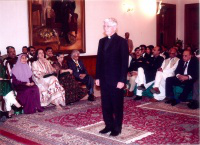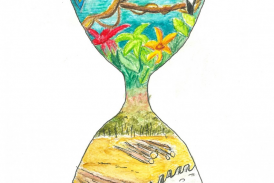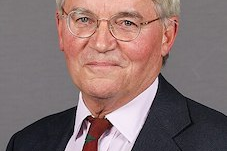Text: Columban priest addresses Pakistan's diplomats to Vatican

Fr McCulloch receiving Sitara-e-Quaid-e-Azam award
The following is an address given by Columban Father Robert McCulloch on 11 April in Switzerland to Pakistan's diplomats to the Holy See. It followed a dinner given by Mr Muhammad Saleem Bhounr, Pakistan's Ambassador to the Holy See, to honour Fr McCulloch's reception of the Sitara-e-Quaid-e-Azam, Pakistan's highest civilian honour. The Irish ambassador to Switzerland and papal nuncio to Switzerland were present.
Your Grace, Your Excellencies, Ladies and Gentlemen.
It was with particular delight and happiness that I accepted the invitation for this evening from Mr Muhammad Saleem Bhounr, Ambassador of Pakistan to the Holy See. I regard him as my ambassador also, having lived more than half my life in Pakistan. And I have lived there happily! Mr Ambassador, when I was appointed to Rome and left Pakistan in late November 2011, I am sure you can understand how I felt: "asman se gira, kajur men atqa [falling from heaven and landing in a spiky date palm tree]".
Mr Saleem and I have a connection, which unknown to us, goes back many years. He was born in a Catholic hospital in Hyderabad in southern Pakistan, St Elizabeth Hospital, and I was for many years the chairman of the Administrative Council of this hospital. So, Your Excellency, we both have deep Sindhi connections: "dil se dil tak rah hoti hai [the best road is the one that runs from one heart to another]".
The Catholic Church, Christianity, has been in the sub-continent, may I say the "Indian sub-continent", for almost 2000 years, before the arrival of Islam and before the emergence of the Sikh religion. The Catholic Church was a constitutive part of the multi-religious, ethnic, and linguistic reality from which the new nation of Pakistan emerged on 14 August 1947. The Catholic Church is no stranger, no intruder, no foreign element in the political, cultural, and religious reality of Pakistan.
There are 3,500,000 Catholics in Pakistan and 1,500,000 Christians in Pakistan, five million in all. Not many, you may say, in a total population of 175 million; but more than the population of New Zealand or Ireland. Figures and statistics can be relative! Six of the seven bishops in Pakistani dioceses are Pakistani. More than 95% of priests and religious sisters are Pakistani. There are 127 young Pakistani men preparing to become Catholic priests in the two major seminaries in Karachi and Lahore. Catholic Pakistanis take pride in both their religious identity as belonging to a world-wide fraternity of believers, the "ahl-e-iman", who number one billion three hundred million and are united with His Holiness Pope Benedict XVI, and in their political identity as belonging to the nation of Pakistan. It is like the two sides of the one coin, or as the Urdu proverb has it: "ek hath se tali nehin bajti [you can't clap hands with just one hand]".
In speaking of identity, I believe that Pakistan itself is presently engaged as a nation in a struggle to establish its identity. Since 1947, the identity issue was in terms of India: "not them", "not Hindu". This was complicated by the truncation of Pakistan in 1971 when the eastern part, East Pakistan, separated and obtained its independence as Bangladesh. Afterwards, especially during the era of the military dictator, Zia ul Haq, there was a turning of the nation towards Saudi Arabia to obtain its identity. This was subsequently characterized by a clinging to the United States of America and is now marked by a chasing after the People's Republic of China.
However, the actual reality of Pakistan, its diversity in religions, cultures, languages and ethnic groups, is the source of and the manifestation of its identity: one out of many. It was this genius of the peoples of Pakistan which Muhammad Ali Jinnnah, the Quaid-e-Azam, the father and founder of Pakistan, identified as the source of the identity of the nation. On 14 August 1947, Jinnah invited people to go in their own ways to their mosques, to their churches, to their temples, but to be collectively one in being Pakistani without difference or distinction and without discrimination. I would like to say how honoured and proud I am to have been awarded a national decoration by the president of Pakistan, the Sitara-e-Quaid-e-Azam, which bears the name of the Quaid-e-Azam.
The mutual diplomatic relationship of the ambassador of Pakistan to the Holy See and the nuncio of the Holy See to Pakistan, along with everything else, enables both parties, the government of Pakistan and the Vatican, to look beyond the "Islamic" constitutional definition of Pakistan to the rich diverse religious and cultural heritage of the Pakistani peoples who are the real constituents of any diplomatic encounter.
But there are now major challenges to the founding ideology of Pakistan, an embracing ideology, which are radically and seriously threatening, even undermining, the identity of Pakistan and which attack the place of Catholics and Christians in Pakistan. Firstly, there are the blasphemy laws instituted in the 1980s as tools of political manipulation by a military dictator who used Islam for his own dictatorial purposes. Secondly, the un-Islamic process of so-called "islamicization" makes people, whether Christian or Hindu or Ismaeli or ordinary Shias or Sunnis, victims in their own country. Thirdly, Pakistani Christians whose families have been living in Pakistan longer than many of the people who came after Partition in 1947 now have to endure the arrogance of some of the descendants of these migrants who claim that they now have the right to decide who is a true Pakistani and who is not. Fourthly, there are the well-publicized attempts by vicious but well-organized fascist-like armed gangs who seek to introduce a reign of terror in Pakistan in the name of religion.
Outstanding and ordinary Pakistanis are beginning to raise their voices against this anti-Pakistan agenda of intimidation and exclusion which is essentially a new system of apartheid based upon religious difference. Significant leaders have been martyred in Pakistan in the last eighteen months in the defense of the vision of Muhammad Ali Jinnah for an including and inclusive Pakistan. They include the governor of the Punjab, Salman Taseer, a Muslim, and the federal minister for minorities, Shahbaz Bhatti, a Catholic. The new Catholic archbishop of Karachi, Most Rev. Joseph Coutts, is outstanding in challenging the political leaders of Pakistan about these sources of increasing religious discrimination.
It seems to me that, in addition to the great religious and social contribution that the Catholic Church makes to Pakistan, which the government recently acknowledged by awarding the Sitara-e-Quaid-e-Azam to me and to Sr Berchmans Conway, the Catholic Church has a special role to affirm and challenge Pakistan and its people and its political leaders about their commitment to the religious and cultural inclusion and harmony in diversity which is the genuine ideology of Pakistan.
Fr. Robert McCulloch
11 April 2012
See also: Columban receives Pakistan's highest civilian honour
www.columbans.co.uk/news/columban-receives-pakistan%e2%80%99s-highest-civilian-honour/





















